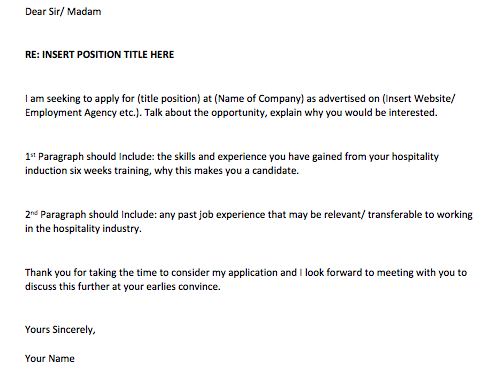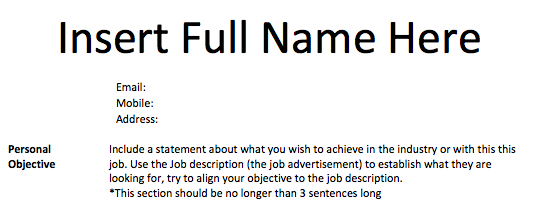Being able to write a resume is an important skill, but it can be hard to know where to start. Below are templates for writing a cover letter and a resume. All you have to do is click on the links and they will download as Word documents to your laptop. Once downloaded, simply open them up and start adding your information.
The templates below were sourced from Opportune People, which is a recruitment agency focused in hospitality. On their website, they have also included other places to get cover letter/resume templates, as well as tips for job interviews, available here.
This is an example of what the cover letter template looks like:

Download this cover letter template here: official-cover-letter-template-opportune-people-oct-2016-1.
This is an example of what the resume template looks like:

Download this resume template here: aofficial-resume-template-opportune-people-oct-2016.
FAQs
What if I haven’t worked before?
If you haven’t had a paid job before, you can still list other experiences you have had, such as academic achievements, leadership, teamwork and unpaid work experience. Click on this link for resume templates for no work experience:
- Academic achievements could include subjects you’ve done well in, assignments you’ve done well in, how you are as a student (well behaved, respectful, good listener etc).
- Leadership could include being in charge of a sports team or a group assignment at school (taking initiative, thinking strategically, being goal oriented, problem solving, organisation skills, communication skills).
- Teamwork could include being on a sports team, working with a group at school (participating, listening, collaborating with a group, problem solving, organisation skills, communication skills).
- Work experience could include work experience you have done at school, any volunteer work, if you’ve helped out with a family business.
Do I need a cover letter?
A cover letter is important to get the employer to read your resume. It is basically a summary of your skills, contact info and availability to work, so it is very helpful to attach it to your resume. You do not have to include a cover letter, however it can help give you more of a chance of being hired!
How do I look for jobs?
You can print out your cover letter/resume and go to a workplace directly. For example, you could walk through your local mall and ask shops if they are hiring.
You can also look online, there are many websites to search for jobs!
- Seek – you can search for you location, job type, job area and set up email notifications for any new jobs listed.
- Indeed – Similar to Seek, you can search for you location, job type, job area and set up email notifications for any new jobs listed.
- Jora – again, the same as Indeed and Seek.
- Facebook – you can search for jobs on Facebook by going to the search bar and writing jobs and your location. For example, in Wollongong there is a Illawarra Jobs Facebook page.
- Gumtree – there is a jobs section on Gumtree for you to look at. Be careful: a lot of jobs listed on Gumtree are cash-in-hand. Cash-in-hand jobs can be risky as you could be underpaid.
- Google search – just type in ‘jobs’ and your local area and a whole list of sites will pop up for you to check out!
Good luck with your job search!
If you have any further questions, or have information you’d like to add to this post, contact us through our contact form or email us at hsc4esl@gmail.com.


